In 2006, I found myself working with a variety of Palestinian groups who wanted to establish an educational center downtown, to create a space for discussion of their legitimate grievances, both about the right of return to Palestine and their situation within Lebanon. The center went up, but then a few days later Israel started its 2006 July war that would last 33 days, destroying the infrastructure of the country, displacing over a quarter of the population, and killing more than 1,400 civilians, a third of them children. The Lebanese army disallowed our presence downtown, and our collective energies were diverted to the various relief efforts to recover from the wholesale destruction rained down on the country that summer.
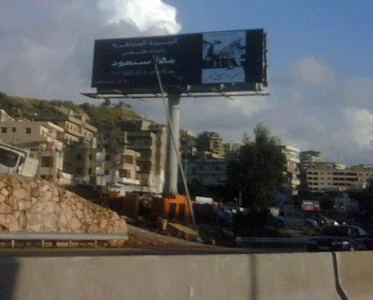
The Return to Palestine billboard, Khaldieh
For the past few years we have worked on a variety of similar projects. Our most recent project was The Return to Palestine on May 15 this year. I worked with the organizational committee of this march for several months. The march was designed from the very beginning to be peaceful: a demonstration of non-violent resistance. Organizing the march involved dozens of civil society organizations, both Palestinian and Lebanese, from inside and outside the refugee camps, and like the meetings for the educational center project in 2006, it was most inspiring during those moments when dozens and dozens of people, sitting around many tables, focused energy on this shared project, putting differences aside.
Now in Lebanon as well as in the West, however, various naysayers have emerged, casting aspersions on the Return to Palestine by darkly alluding to the “rabble” being manipulated by political and religious parties and factions. Those naysayers must be answered, for they reveal, in and of themselves, the class distinctions that drive and divide this country, indeed this world. It is to those naysayers that I address this missive.
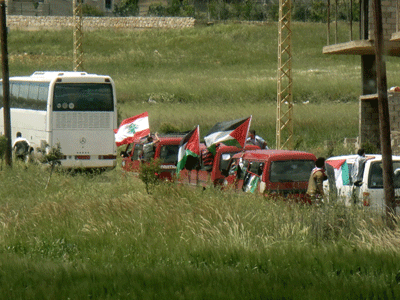
Busses waiting to go up the last hill at Maroun Ar-Ras
By casting aspersions on this or that group,from the privilege of your social status, from the luxury of your class position, you are effectively removing yourself from any positive action for change. You do as you please, but what you are doing is also what the oppressors want, so, know whose work you are accomplishing. As long as the groups you castigate act “true to form” as you have it, you can maintain your sense of superiority, your Western-ness, your conceptions of democracy, all the while using them to denigrate others seen as intrinsically incapable of manifesting your “values,” ignoring the negative incentives that your divide-and-conquer strategy imposes on such groups. This is the great Orientalist project, the mimicry of criminal buffoons such as Thomas Friedman and Bernard Lewis, the height of self-loathing when it comes from those on the local scene, what is referred to as the local comprador class of intellectuals. As usual, you have nothing worthwhile to add to this discussion. To be sure, the means of discussion are mostly within your control, your power structures, and your notions of proper discourse. So even when saying nothing, things still fall in your favor.
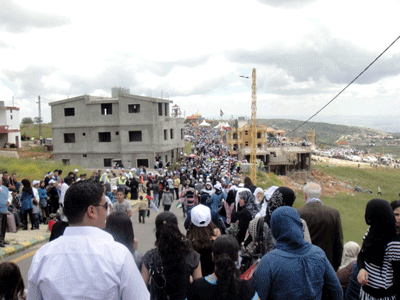
Men, women, children, making their way up
All the same, recent events in North Africa and West Asia speak to us of a different way, outside of your conformist will and control. Because the “rabble” as you refer to them do act with purpose. The “zaa’ran” as you describe them do form councils, work with consensus, organize logistics. It is the “masses” who feed ongoing demonstrations, indeed a revolution; clean and keep orderly a public square full of demonstrators; and prevent counter-revolution from being imposed by those who wish to eternally keep them down. Engaging with those whose lives are thus discounted is a revolutionary act in and of itself, and in this regard, the political or religious parties or factions alluded to above are miles away more progressive and revolutionary than the reactionary and conservative naysayers rushing in to present their narratives to “correct” the “rabble” and stabilize the status quo. For unlike you, they are open to this dialogue. Their local reality is based on notions of equality and collectivity, a common good. I am saying this now because I witness it. And I am saying to you that we are not waiting for your permission, nor your approval, not to mention your ridiculously offensive taking of credit, technologically speaking or otherwise, for what is an intrinsically communal, local and unmediated, broad-based and wide-ranging grassroots coalition focused in the long term on the difficult work of revolution. Are you still stuck in your neo-liberal Western concepts of individual liberties? This leaves you very, very alone in a rapidly changing world.
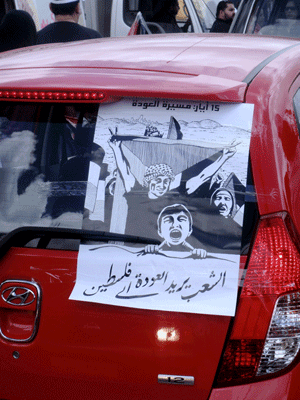
“The People Demand the Right of Return to Palestine!”
We understand that this threatens those who maintain their positions of power based on defining this difference otherwise. But whom would I rather speak to? An individual with so-called “socially progressive views and values” who also happens to love going to Starbucks, who hires domestic slave labor, and who sends their children to elite private schools where they are shown Schindler’s List in history class? Or would I rather engage with those who are seen, described, and denigrated as being the exact opposite to the said views and values, but who understand concepts such as “oppressed” and “oppressor”? Who believe in the dialectic as the basis of understanding? For these “socially progressive views and values” are, in fact, reactionary, stultified, reductive and static. And they do not bring any semblance of freedom. You are not free until all are free based on the common will, not on, for example, an outdated French legal system, a relic of colonial times. And if you do not work toward this freedom for all, then you are just helping maintain the status quo; and it is this maintenance of the how-things-just-are that is killing four-fifths of the planet. It bears stating aloud: There has always been more potential for revolution in the various liberation theologies that merge theory with reality on the street than in any latter-day “secular” theoretical framework that attempts to impose itself from a distance. And thus those baby boomers, the children of the ’60s, who have now proven to be more oppressive than those they feigned protesting against. And thus those left-wing European intellectuals who are taking up racist and oppressive discourses as readily as those who oppressed them during the two great wars of recent history. And thus the so-called social progressives whose press statements could have been typed up by the U.S. State Department. And thus the local compradors, providing fodder for the Western hunger for one-dimensional descriptions of the local Other. Their divorce from the street is a divorce from a reality that is now rising up and shaking up — from Intifada.
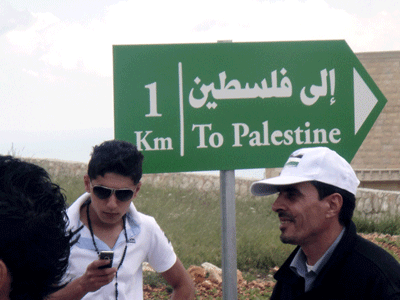
One of the signs put up for the occasion
Imagine the following as an exercise: You limit yourself to the places that are considered public to, say, a Syrian worker, or a Sri Lankan slave. You do not enter a restaurant whose staff cannot walk in themselves and get a table. You do not go to a beach that invokes racist entrance policies. You only avail yourself of public transportation. You live as most live, outside of security-guarded homes. You send your children to public schools. You no longer view neighborhoods only as venues for your entertainment. You do not form false communities, virtual or otherwise, outside of your actual community. You do not fall back on the security of your societal status. How long will you last? Remember your freedom, the luxury you enjoy, to do as you please where you please, and then imagine being forbidden to grow facial hair at your so-called “secular” workplace; or not being allowed to wear a veil in your so-called “Westernized” place of employ; or not being welcome to walk in downtown Beirut, for being an ordinary worker; or being evicted from a public beach, for being Filipina . . . all in the name of keeping up the so-called “modern” image that you just happen to fit into. How do you explain this, without resorting to the worst kinds of stereotypes, derogatory statements, vile epithets? How do you allow such noxious unwritten rules? And how, then, do you make accusations against those who marched on Sunday, when, in fact and at long last, it is they who should be accusing you? Who exactly needs to change in order that all might live? Who exactly needs to change in order that all might find freedom? And if you can understand this, can you then not understand young Palestinian men and women willingly putting themselves in harm’s way? Domestic workers throwing themselves from balconies to escape their oppression? Slave laborers literally working themselves to death because they don’t have any other choice? Indian farmers killing themselves in the tens of thousands? Welcome to Lebanon. Welcome to this world. It is all connected. And we are not in a place where “boutique causes” are remotely a possibility.
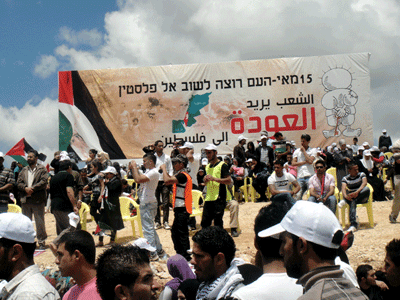
Ish-shaab yuriid al-aa’wda illa filistiin! [The people want to return to Palestine!]
Given that these are issues of imperialism, and of colonialism, and of racism, and of the neo-liberal nightmare that the Anglo-Saxon capitalist project imposes on us all, one of whose linchpins is the imposition of a colonial settler outpost, the imposter entity of Israel, then it stands to reason that the plight of the Palestinians is in turn at the center of economic inequality that underpins racism, sectarianism, the absence of various forms of individualized “rights.” Jobless in Wisconsin? Stand up for Palestine. Homeless in Pasadena? Walk with the Palestinians. Evicted in New York? Fight for the right of return. Salary not commensurate with a man’s? Come walk. Corruption in government? Walk with us.
So, you might want to avoid, for example, during a meeting of one of those anti-sectarian groups in Beirut, standing up and declaring, without irony, that you are offended “as a capitalist” by the discussion taking place. For in this there is no hope; it is lost before you even begin. Or you might want to avoid, for example, after the popular demonstrations during the 2008-9 war on Gaza, the “Hamra counterpart,” the “designer” version of a popular uprising, or the candlelight vigils during the Summer War of 2006, the mediated reality made consumable for outsiders and the Time Out magazine, with these separate groups not mixing or communicating in any way. In this you have the recipe for a lost cause. And you are thereby doomed. When the reverse happens, organized from the ground up, you will have to expect that it might not be according to your rules. This is an invitation to truly involve yourself, not to turn around and defame those whose existence you have not recognized. Otherwise you’ve lost before you’ve even started.
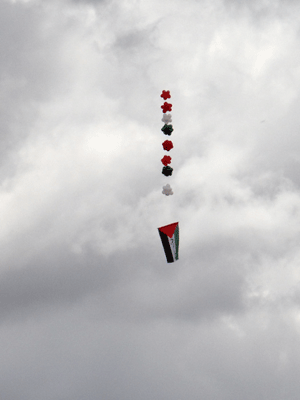
Balloons carrying the flag back home
Have you forgotten so quickly those 33 days of war? Of bombs and displacement, of racist leaflets dropped from the sky? Of cluster bombs that still litter the lands of the south to such an extent that those down in the wadi last Sunday faced a danger from them in addition to the bullets (we were warned not to go off the main path because of their continuing presence five years after they were delivered from the sky, rained down in the millions)? Have you forgotten? Or are you unable to remember because it didn’t happen directly to you? What were you saying about sectarianism? About difference? What distance is this? How do you maintain it? How many different levels does it have, and have you attempted to lessen it? Furthermore, who indeed is more capable of and should be more responsible for lessening it, for bridging this gap? Given the history of Palestinians in the south, what does it then say of those crossing this distance, working past it, coming together to form the nexus of a popular movement? Are you that cynical to dismiss this? Or does your reaction come from something else, from somewhere else? Put it out on the table; I want to know where you see yourself in all of this. I want to know where you stand.
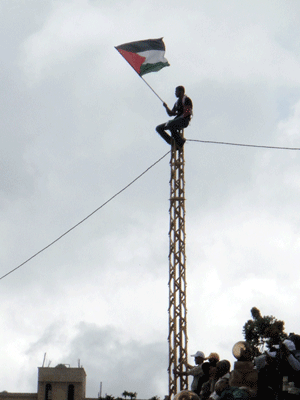
The international flag held high
How can you not imagine the emotion of living life, generation after generation, in one kilometer squares, and then finding oneself 500 meters from one’s homeland? How can you possibly deny to people, unarmed and peacefully marching, the right to make a statement? Why are you horrified that some of them managed to cut the fence or climb the fence? Why would you allow that artificial border to be entrenched and made permanent by your acknowledging of its existence? Why would you add the force of your voice to the bullet that stopped this one returning home dead in his tracks? Is this not a recognition of the Israeli entity? An acceptance of the power differential of this world? Are you willing to make that statement out loud? Are you willing to pick up that rifle and shoot? Do not dare call these martyrs puppets of parties or factions. Do not dare deprive them of agency. Do not dare attempt to deny that those organizing the Return to Palestine were also down in that same valley protesting. Do not dare create distance where there was none. Do not dare. For we know, we witnessed. You do not get to impose your sterile distance on us, your ignoble cynicism, a divisive tactic worthy only of the enemy.
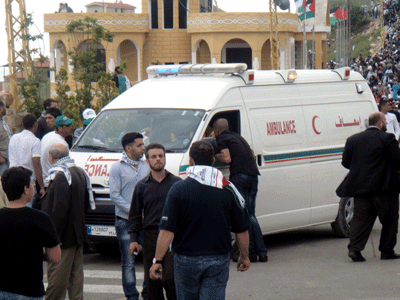
Ambulance after ambulance, bringing up the dead and wounded
You were not down in that valley. And you were not at the demonstration, 70,000+ strong. And you were not at the meetings. And you were not in the hospitals. And you were not at the funerals. And you do not go into the camps. And you do not know. And you are removed to your Twitter world, your Facebook realm, your Gemmayzeh bubble, all distancing you from reality. Your ivory tower, your private residence, your walls, your gates, your gaze from far afield. There is no revolution that comes from your fortress. There is no revolution to be found in your modernism or post-modernism, your Europe of decrepit monarchs and official churches which has given you your “secularism” and your “Enlightenment.” None. Not ever. This leaves a choice: critique, if you must, from the inside, join us and take your stand, or else do us the favor of saying nothing at all. But even your silence comes prepackaged with the received wisdom. Saying nothing at all, not even allowing a word to escape your lips, you already speak volumes for those already in power. And we are tired of it.
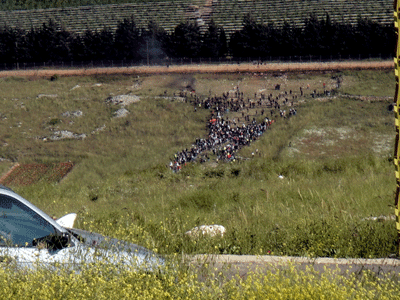
I shall fear no evil. . . .
And before you resort to those particularly obnoxious notions of “culture of death” and “culture of martyrdom,” cynically blaming those cold-blooded murders on the very murdered themselves, aka blaming the victim, before you bring this up as a condescendingly smug and self-satisfied “I told you so,” allow me to quote Huey P. Newton, one of the founders of the Black Panther Party — another group targeted with a similarly racist and classist discourse, negatively compared with Martin Luther King, Jr., whose non-violence was all the same dealt an equally deadly blow — who said, explaining his notion of “revolutionary suicide”: “We have such a strong desire to live with hope and human dignity that existence without them is impossible.”
Remember that this so-called “suicide” exists as a function of and in the face of the endlessly violent project that is capitalism. This violent response is in answer to much greater violence that is systemic (and yet, unfortunately, easy for some to remove themselves from and dismiss wholesale). And thus the quest for human dignity as the basis for revolution in this part of the world; not the price of bread, or benzene, or a roof over one’s head. Here are those who love life for all, human dignity for all, freedom for all. This explains the endless waves of people heading down to that fence. If you cannot comprehend that, then there is no point in even hearing your side of the argument — your opinion is the given, the status quo, the quotidian. And it is a violent statement; it is part and parcel of a great and cataclysmic violence. We know it. And at this point in time, we are bored to tears of it.
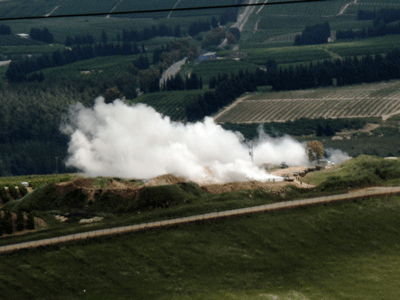
The smokescreen of the IDF that allows rifle snipers to come into position
To understand the position of power you speak from, the violence of your words equivalent to the violence of the cowardly and murderous civilian-soldiers who mowed down 11 (and counting) on this Bloody Sunday, you need only realize that your media, your academia, your associations, your NGOs, these middle-grounded enablers of power in your society all reflect, abet, sustain, and perpetuate this hegemonic discourse of death and destruction implicitly and explicitly. There is no gray area. And what is violence? A cast rock? Or the absence of health care? A thrown stone? Or the absence of electricity, of running water, of valid work, of proper housing, of education? To state that revolution is violence and that daily life as most know it isn’t; that the Internet controlled by few and the Western media controlled by few are in any way “democratic” and that our organizing committees aren’t; that there is validity in a “peace process” or an eventual “Palestinian state” that is not the entirety of Palestine while in our demonstrations that took place on May 15 there isn’t any — this is to twistedly play Orwellian with what has always been a life-and-death struggle. And you have chosen the side of death. And we are sick to the death of your choice.
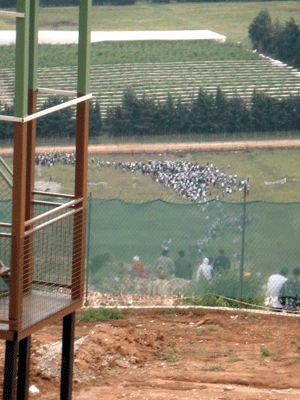
The Palestinians will return
Watch this video [.mov; .flv], listen to the Lebanese army emptying their weapons in an effort to clear the valley, only ending up masking the sound of enemy rifle fire that laid low the precious lives of those yearning for return. Smoke and soundscreens; the planned and strategic work of cowards, as documented in their PowerPoint presentations and in their brochures and in their training manuals. Who runs this enterprise of death and destruction, pray tell me? Who lays waste to lives requiring survivors to play an endless game of memorializing those lost? Why do you prefer these numbers and statistics to the faces, the portraits of these, the defenseless, murdered in cold blood; these, the sons of Palestine, on this, the first day of the Third Intifada?
Saleh Hassan Bursheed. Mohamad Samir Saleh. Mohamad Abu Shulaih. Imad Abu Shakra. Mohamad Bakri. Hassan Mousa. Mahmud Mohamad Salem. Abdul Rahman Said Sobha. Mohamad Al-Mousa. Khalil Ahmad Mohammad.
Allah yirHamhun. God’s mercy upon them; and strength to their families and comrades.
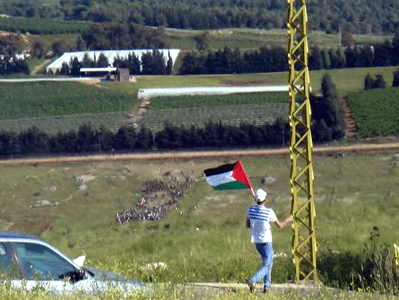
Filistiin Hurra [Free Palestine]!
And here’s the flag, a flag of international import, heading down toward Palestine. And it will return, as long as it takes. And Palestine will be free. And it is now obvious that revolution will come from below; counter-revolution is the only thing that can come from above. And thus there is a stand to take. And we are not pausing along the way to listen to what you might have to say. And you can join us; you are of course welcome to join us; we open our hearts and arms to those who choose to join us. And if you choose not to join us then please, please: Shut up and move out of the way.
Daniel Drennan is founder of the Jamaa Al-Yad. He lives and works in Beirut, Lebanon, and can be reached at [email protected].
| Print
